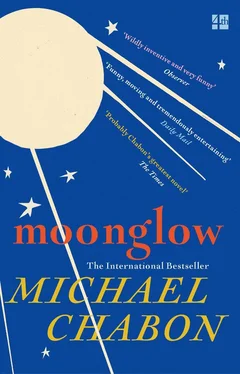She folded the chamois in half, smoothed it against the swell of her hip, folded and smoothed it again. She handed it back to my grandfather, and he returned it to the back pocket of his khaki shorts.
“Fucking alligator,” she said. “He should choke on Ramon.”
For that, Sally Sichel got a checkmark.
“Let me look into it,” he said.
Sally Sichel stepped back and gave my grandfather a careful once-over. The opinion she had formed of him now appeared to be in need of emendation. Doubtless she had noted the baggy shorts, the sandals worn over socks, the coral-pink polo shirt appliquéd, as if out of sensitivity to the fate of Ramon, with a leaping fox (or possibly a wolfhound) in place of the usual crocodile. He looked like the retired director of a Zionist summer camp. Now she considered his hair, silver turning to white, straighter and finer than in younger days but still a good head of it. She noted his suntanned, sinewy arms, his broad chest, the shoulders that over the years had borne up under the weight of pianos and other burdens. For some reason—she had not noticed until now—he was carrying a big iron wrench, his fingers flexing restlessly along its shaft as if he were itching to use it.
“Let you ‘look into it’?” She laughed. It might have been a bitter or even a mocking laugh. Or maybe he had just cracked her up. My grandfather had spent his life saying things in earnest that struck people, women in particular, as funny. “What does that mean?”
My grandfather supposed it was a strange thing to have said. A more honest formulation would have been that he intended to see what could be done in the area of kicking an alligator’s ass. But that also would have been a strange thing to say. At best it would have sounded like swagger, at worst like psychopathy. If he failed to kick the alligator’s ass, it would be an idle boast. That was the problem, finally, with saying things, in particular things that were true. Yesterday his doctor had shown him a couple of numbers on a blood panel that looked “a little off,” and said it might be nothing serious or it might be very bad. He wanted my grandfather to see a specialist. He had written down a name and a number on a card. The card was stashed inside the Commentary , keeping company with an unflattering caricature of Hosni Mubarak.
My grandfather was seventy-three. Over the course of his life, the definition and requirements of manhood had been subject to upheaval and reform. Like the electoral laws of his adopted home state, the end result was a mess. A patchwork of expedients, conflicting principles, innovations nobody understood, holdovers that ought to have been taken off the books years ago. Yet in the midst of modern confusion, fundamental kernels of certainty remained: Representative democracy was still the best way to govern a large group of human beings. And when some lady’s dead husband’s cat got eaten by an alligator, a man looked into the matter. Even an old man who wore socks with his sandals and needed to see a specialist because something was off in the numbers that told the story of his blood. A man would see what there was to be done.
“I could research what the proper procedure is with alligators,” my grandfather said. After all, alligators were dealt with every day in a variety of ways. They could be trapped, snared, hit with tranquilizing darts. They could be shot, butchered, skinned, and turned into steak and boots. “I mean, if you like. I realize it won’t be any help to Ramon.”
Sally Sichel started to laugh, but this time she caught that my grandfather wasn’t joking, and her mouth snapped shut. Her cheeks turned bright red, but it was not out of embarrassment, because she looked him straight in the eye. “Why not?” she said.
There was the whirr of an electric cart. My grandfather looked toward the service area. It was Devaughn, the night guard, coming to find out who had been making all that noise. Devaughn was almost as old as the people he was paid to protect. He had been born and raised in the part of Florida that was really Georgia and Alabama. No one was sure if he was white or black—it could have gone either way—and those residents of Fontana Village who were deputized or inspired to ask found that in his presence, their nerve failed them or the relevance of the question dwindled away. He had been taught as a boy to regard the occasional Jewish salesman who passed through his native swamp as belonging to a race of lesser demons, horned and dealing in wonders. His manner toward the residents of Fontana Village was suitably tinged with wariness.
Devaughn listened to the story of Ramon and the alligator, and it was not long before he started shaking his head. At first my grandfather took Devaughn’s head-shaking for an expression of regret, commiseration, or disgust. But it turned out that Devaughn felt there was schooling that needed to be done.
“That is not no alligator,” he said. “Been telling Ms. Radwin almost two years now. I have seen its bowel movements. I know how a alligator bowel movement supposed to look. And I know how a snake bowel movement supposed to look.”
“A snake,” Sally Sichel said. “A snake that can eat a cat or a dog? Does Florida have snakes like that?”
“It’s probably somebody’s pet boa constrictor that escaped,” my grandfather said. Once when I visited him, we had watched a program on channel 12 (the only channel my grandfather watched) about the problem of invasive animal species in the state of Florida. Boas, mynahs, feral pigs, rare aquarium fish had escaped captivity or been deliberately released into the wild, where generally they had done well for themselves. The program had been an hour long, but my grandfather waited in vain for a discussion of what was to be done about the invasive species that was really the cause of the problem. “If it’s a boa constrictor, it could get big enough to eat a pig or a deer.”
Sally Sichel, my grandfather, and Devaughn looked at the Jungle. The idea of a giant snake that could strangle a pig or a deer and then swallow it whole slid cold and coiling through their hearts. Then Devaughn got into his cart and whirred away, back to the security desk in the Village Center. Let the day man worry about giant snakes and crazed old Jewesses wandering out into the weeds at the crack of dawn, hollering when they were supposed to be sleeping.
“Speaking of eating a pig or a deer,” Sally Sichel said, “I could make you some French toast.”
My grandfather looked at his watch and his heart seized. He had forgotten all about the launch. If he left now, drove fast, and didn’t stop, he would probably, with a little luck, just make it in time. He had been planning for months, since the Return to Flight was first announced, to do this trip up to the Kennedy Space Center. He knew the names and ranks of all five members of Discovery ’s crew. He could tell you the fields of their graduate and post-graduate work, their mission histories, their hobbies and foibles, their relationships and personal ties to the lost crew members of Challenger . He had followed the investigation into the cause of that disaster acutely, delving into its minutiae. During the visit of mine that had featured such a fine dish of macaroni and cheese, all my grandfather wanted to talk about was O-rings, ceramic-tile heat shielding, and Dr. Richard Feynman—always referred to by full name and title. In Feynman’s relentless common sense, my grandfather saw rare evidence of hope for the world.
For months he had felt that it was not just the shuttle program that would be at stake when Discovery blasted off. It would be an entire vision of the future, shared by all the fading partisans of space flight, for whom the launch held the promise of collective redemption. Now my grandfather understood that his interest in the loss of Challenger and the fate of Discovery , his obsession with the modifications that had been made to its solid rocket booster, or to Commander Rick Hauck’s vintage Corvette, amounted to nothing grander than Sally Sichel’s feeling that she was living only to care for her late husband’s cat. There was nothing collective about it. It was purely personal, a seal to stop his heart against a leak of sorrow. Seen in that light, the whole business struck him as much less interesting.
Читать дальше












